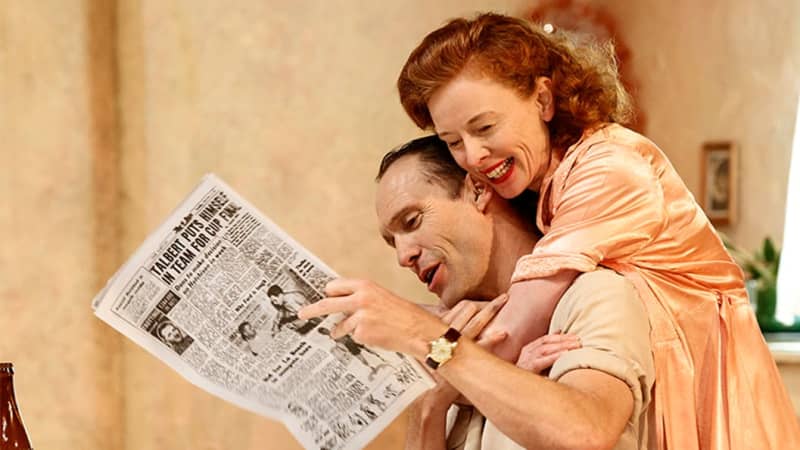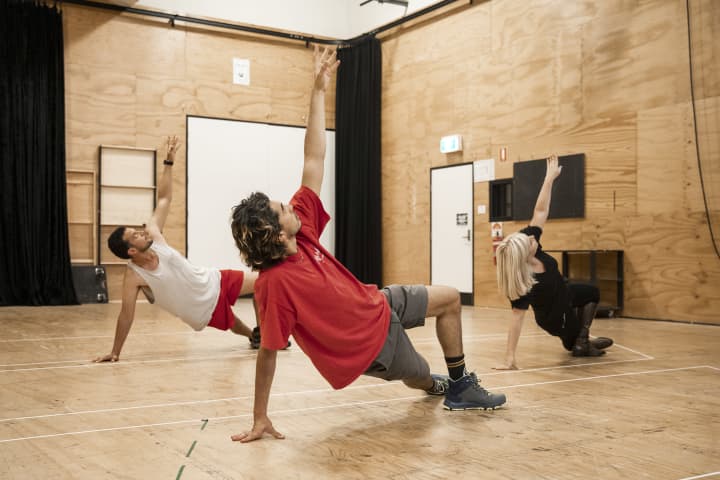‘Performance Photographer.’ It’s a career choice rarely recommended by your standard-issue guidance counsellor. Perhaps that’s because there are so very few of them. But one name makes it look easy: Jeff Busby.
Whether opera, ballet, musicals or theatre, when you open the paper or click on a link to check out a show, it’s Busby’s still images you’ll find staring back at you. He’s held the reigning title of Melbourne’s premiere performance photographer for over 30 years now – since he first shot rehearsals for the Australian Dance Theatre in 1987, when he was just 27 years old – and there’s nary a rehearsal room or preview that hasn’t included his presence.
The reason that Jeff Busby is almost the only name in shooting theatre is simple: he loves it. Most photographers will agree that, when the going’s good, it’s the best job on the planet. But few of them approach their craft with the dedication displayed by Bubsy.
‘Jeff is an artist in his own right, and he brings that sensibility to his own work,’ explains director Sam Strong, who’s worked with Bubsy on so many of his own productions that he can’t recall a number. While he was artistic director of Queensland Theatre, he’d sometimes fly Bubsy up to Brisbane to shoot his shows. ‘Production photography is enormously important for a creative team. You spend months – sometimes even years – imagining how a production will look and breath it into life.’

Image 1 of 8 – Storm Boy (directed by Sam Strong), 2019
Photo: Jeff Busby
Image 2 of 8 – Double Indemnity (directed by Sam Strong), 2016
Photo: Jeff Busby
Image 3 of 8 – Jasper Jones (directed by Sam Strong), 2016
Photo: Jeff Busby
Image 4 of 8 – The Weir (directed by Sam Strong), 2015
Photo: Jeff Busby
Image 5 of 8 – Private Lives (directed by Sam Strong), 2014
Photo: Jeff Busby
Image 6 of 8 – The Crucible (directed by Sam Strong), 2013
Photo: Jeff Busby
Image 7 of 8 – Other Desert Cities (directed by Sam Strong), 2013
Photo: Jeff Busby
Image 8 of 8 – Sam Strong in rehearsal on Nearer the Gods, Queensland Theatre 2018
Photo: Jeff BusbyPsychology and Photography
Born into an Air Force family, with an engineer father and a biologist brother, Busby found himself enrolled in a science degree when he first went to uni. ‘I’m a practical sorta person: I build things, I fix things, I landscape gardens,’ he explains. ‘I didn’t really know what I wanted to do, so I was studying sciences and it was great. But once I got to uni, I realised that I had a spare subject, so I did psychology. So I finished up heading off more in that direction.’
At first, Busby’s psychology skills were applied in a more traditional sense, offering crisis care to victims of crime. ‘We had these kinda cop cars, and we used to prowl around, mopping things up,’ he says.
‘Actors bring you to a point that’s a portal through to so many things ... if you don’t choose to go through there, I think you’re missing out.’
But, after becoming fixated on the French New Wave and on directors such as Antonioni and Polanski, he began to understand that his calling was not so much fixing people but understanding them. And the way Busby chose to understand them was with his camera. ‘Actors bring you to a point that’s a portal through to so many things. But if you don’t choose to go through there, I think you’re missing out – even if it can be painful at times,’ he explains. ‘It really is truth. It’s what humans are.’
With a humble black and white (film) camera, Busby first approached The Age, whose reviews editor gave him a commission. Soon, he was photographing million-dollar shows like Cameron Macintosh’s Les Misérables. Although he’d never studied photography, he found his science background (and his natural ability) saw him through.
‘I just kept getting offered jobs, so I didn’t have time to worry. I didn’t have time to think. I was offered jobs way beyond my ability in the early days, because there weren’t that many photographers out there doing what I did,’ he recalls. ‘There were some really great photographers out there who kinda dabbled in performance photography. If you go back through the archives at the MTC, you’ll find photographs by Helmut Newton...’

Image 1 of 3 – Henry IV, Part 1 at the NGV (directed by John Sumner), 1969
Photo by Helmut Newton & Henry Talbot
Image 1 of 3 – Henry IV, Part 1 at the NGV (directed by John Sumner), 1969
Photo by Helmut Newton & Henry Talbot
Image 3 of 3 – Henry IV, Part 1 at the NGV (directed by John Sumner), 1969
Photo by Helmut Newton & Henry Talbot
‘There’s no denying it’s a photograph, and it’s not the real thing. It’s something else. And it’s my responsibility to make that something else loaded with as much information as possible.’
But, unlike that venerable portrait photographer, Busby decided to stick with the thing that gave him the most pleasure. ‘Being a photographer is a lot of fun,’ he says. ‘I’m fortunate to have had a career that’s just covered my expenses enough to not have to apply for grants, and [that I am able to] do my own thing off the back of being a performing arts photographer. Most days, I’m just immersed in really high-end artistic influence. I just move from one to the next. And I’m no butterfly: I drink deep. I really absorb it.’
History and Photography
His mission, as he sees it, is to show all the complicated web of subtext, references and allusions that go into the creation of a play. ‘There’s no denying it’s a photograph, and it’s not the real thing. It’s something else. And it’s my responsibility to make that something else loaded with as much information – coded and uncoded – as possible, to my best of ability. To make it deeper, so that people can enjoy it straight-up,’ he explains.
‘One of the things I’d like to think I bring to a performance is the ability to layer the current performance over a matrix of deep understanding of the history of the visual precedents – where the director’s coming from, where the lighting’s coming from, where the writer’s coming from, and how it’s played. Whatever the medium, someone’s really mined history. And then I can play with it too, because I’ve got my own ideas about what happened in the past, about what’s important.’
It’s for this exact reason that acclaimed directors such as Strong return to Busby again and again to capture their shows. ‘He brings the history of Melbourne theatre into the room. I think of a show like Endgame [2015], where Jeff will tell me about the Anthill production of Endgame he shot [in 1991]. It’s this really lovely way of connecting with the longer-term history,’ says Strong. ‘You’re not just talking about someone who is engaging in a technical exercise.’

Image 1 of 2 – Endgame (directed by Jean-Pierre Mignon for Anthill Theatre Company), 1991
Photo: Jeff Busby
Image 2 of 2 – Endgame (directed by Sam Strong for MTC), 2015
Photo: Jeff BusbyFor the love of the art
Because Busby is so invested in genuinely engaging with the depth and complexity of a work, he also brings a kind of personal sensitivity that’s essential for capturing something he thinks of as true: ‘These guys have been working for months and months to achieve their vision. My job is to come in and see it,’ he explains. ‘You walk into this room, and you’ve got to instantly have a feeling for what’s going on. That can be painful, because all your antennae are out. But at the same time, you’ve got to show that you’re totally in charge. Any hint that you’re scared or worried will send shivers down their spine. You need to be the person who turns up and gets the shot. There’s this weird balance of sensitivity and confidence in yourself.’
‘Isn’t it a fantastic thing to do as an occupation? You launch yourself into that, you’ve got a lifetime of fun. You cannot ever run out of things to look at, things to understand.’
It’s that gentle, patient understanding that Busby radiates when he’s on the job that, to Strong, makes him the ideal performance photographer. ‘Making any sort of art, but particularly theatre, is a very exposing exercise. You tend to surround yourself with people you like, and who understand the nature of that risk, and how much that asks of people personally,’ he recalls. ‘Production photography is taken at an incredibly vital – but also vulnerable – moment. By that stage, the show is formed to a certain point but it hasn’t yet met an audience. So you’re in a very delicate place as a creative team. At its core, his skill is about his love for, and sensitivity to, the art form. Jeff deeply loves and understands theatre. Or at least he appears to.’
For his part, Busby’s deep-seated affection for the theatre not only makes him the ideal photographer, but (from a selfish perspective) provides a unique individual with the ideal job. ‘Isn’t it a fantastic thing to do as an occupation?’ he says. ‘You launch yourself into that, you’ve got a lifetime of fun. You cannot ever run out of things to look at, things to understand. It’s so different from trying to work out “who I am” and all that sort of stuff. Who cares? There’s so much more interesting stuff out there.’
Jeff Busby selects
Below, Busby shares select image galleries from some of his favourite shoots, for both MTC and other performing arts organisations.

Image 1 of 10 – Twelfth Night (directed by Simon Phillips), 2018
Photo: Jeff Busby
Image 2 of 10 – Born Yesterday (directed by Dean Bryant), 2017
Photo: Jeff Busby
Image 3 of 10 – Faith Healer (directed by Judy Davis), 2017
Photo: Jeff Busby
Image 4 of 10 – Macbeth (directed by Simon Phillips), 2017
Photo: Jeff Busby
Image 5 of 10 – Death and the Maiden (directed by Leticia Cáceres), 2015
Photo: Jeff Busby
Image 6 of 10 – His Girl Friday (directed by Aidan Fennessy), 2012
Photo: Jeff Busby
Image 7 of 10 – Summer of the Seventeenth Doll (directed by Neil Armfield), 2012
Photo: Jeff Busby
Image 8 of 10 – The Pillowman (directed by Simon Phillips), 2007
Photo: Jeff Busby
Image 9 of 10 – The Sapphires (directed by Wesley Enoch), 2004
Photo: Jeff Busby
Image 10 of 10 – Faust (directed by Barrie Kosky), 1993
Photo: Jeff BusbyPublished on 21 May 2020












